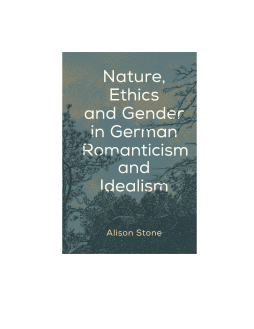
Additional Information
Book Details
Abstract
This book provides an account of the development of ideas about nature from the Early German Romantics into the philosophies of nature of Schelling and Hegel. In clear and accessible language, Alison Stone explains how the project of philosophy of nature took shape and made sense in the post-Kantian context. She also shows how ideas of nature were central to the philosophical and literary projects of the Early German Romantics, with attention to Friedrich Schlegel, Novalis and Hölderlin. Stone advances a distinctive, original perspective on Romantic and Idealist accounts of nature and their ethical implications regarding human-nature relations and intra-human political relations, especially but not only around gender and race. The book demonstrates how these approaches to nature have contemporary relevance to a range of current debates such as those over naturalism, the environmental crisis, and the politics of gender, race and colonialism.
Alison Stone is Professor of European Philosophy at Lancaster University. She is the author of Petrified Intelligence: Nature in Hegel’s Philosophy (2004), Luce Irigaray and the Philosophy of Sexual Difference (2006), An Introduction to Feminist Philosophy (2007), Feminism, Psychoanalysis and Maternal Subjectivity (2011), and The Value of Popular Music (2016). She edited the Edinburgh Critical History of Nineteenth-Century Philosophy (2011) and co-edited the Routledge Companion to Feminist Philosophy (2017). She co-edits the Hegel Bulletin.
Nature, Ethics and Gender in German Romanticism and Idealism uncovers issues at the heart of post-Kantian philosophy. Stone breathes new life into figures such as Schlegel, Novalis, Hölderlin, and Hegel, placing their thought into dialogue with contemporary environmental and social justice issues. Stone’s work tells the story of our alienation from and our reconciliation with nature in bold, beautiful detail.
Elizabeth Millán Brusslan, Professor of Philosophy, DePaul University
Unlike many specialists on Hegel or the early German Romantics who articulate their positions each by criticizing the other, Alison Stone's important and timely work considers the two traditions in implicit conversation with each other. Stone's essays present the full range of this rich period, with its attentiveness to the philosophically underrepresented themes of nature and gender, while also exposing its blind spots.
Elaine P. Miller, Department of Philosophy, Miami University
This book deals with the fascinating but neglected topic of views of nature in post-Kantian German Romanticism and idealism. With impressive clarity and erudition, Alison Stone brings this tradition to life, while also subjecting it to critical analysis. She shows why it deserves our attention, and how key figures such as Schelling, Hegel and Hölderlin should be understood in this context.
Robert A. Stern, Professor of Philosophy, University of Sheffield
Table of Contents
| Section Title | Page | Action | Price |
|---|---|---|---|
| Contents | 7 | ||
| Acknowledgements and Permissions | 9 | ||
| Abbreviations | 11 | ||
| Chapter One: German Romantic and Idealist Accounts of Nature and Their Legacy | 17 | ||
| Part One: Romantic Nature | 35 | ||
| Chapter Two: The Romantic Absolute | 37 | ||
| Chapter Three: Friedrich Schlegel, Romanticism and the Re-Enchantment of Nature | 57 | ||
| Chapter Four: Being, Knowledge and Nature in Novalis | 79 | ||
| Chapter Five: Alienation from Nature and Early German Romanticism | 101 | ||
| Chapter Six: Hölderlin on Nature | 117 | ||
| Part Two: Hegel and the Philosophy of Nature | 137 | ||
| Chapter Seven: Philosophy of Nature | 139 | ||
| Chapter Eight: Hegel, Naturalism and the Philosophy of Nature | 157 | ||
| Chapter Nine: Hegel, Nature and Ethics | 175 | ||
| Part Three: Hegel, Gender and Race | 187 | ||
| Chapter Ten: Sexual Polarity in Schelling and Hegel | 189 | ||
| Chapter Eleven: Matter and Form | 207 | ||
| Chapter Twelve: Gender, the Family and the Organic State in Hegel’s Political Thought | 223 | ||
| Chapter Thirteen: Hegel and Colonialism | 241 | ||
| Chapter Fourteen: Hegel and Twentieth-Century French Philosophy | 263 | ||
| Bibliography | 283 | ||
| Index | 293 |
